DARFURIS IN THIS VIDEO ASKING OBAMA TO DO WHAT HE SAID HE WOULD DO - SO WE'RE ALL WAITING FOR YOU, PRESIDENT OBAMA
President Obama said many things during his campaign. He claimed he would be a leader regarding Darfur. And yet, he has only led with his silence and appointing a hugely ineffective Special Envoy to Sudan, Scott Gration.
Obama apparently believes he has little political price to pay for ignoring his own words about stepping up to the plate regarding Darfuris. As one who went door to door for his Presidential campaign even though it was completely outside of my comfort zone, I know this: I will never go door to door for him again. I believed him when he said:
"The United States has a moral obligation anytime you see humanitarian catastrophes…we have the most stake in creating an order in the world that is stable...in which people have hope and opportunity and when you see a genocide whether it's in Rwanda, or Bosnia or in Darfur - that's a stain on all of us, that's a stain on our souls...I was the first along with Senator Brownback to focus on ratcheting up sanctions and getting an envoy in there who was serious. We worked diligently to get the Darfur Peace and Accountability act passed…I think the level of commitment and the way that I’ve spoken out on this issue indicates not only knowledge, but also passion in bringing an end to this crisis. It’s very encouraging to see activism based not on self-interest, but on moral imperative …We can't say 'never again' and then allow it to happen again. And as President of the United States I don't intend to abandon people or turn a blind eye to slaughter.”
See it here: www.youtube.com/watch?v=QEd583-fA8M
November 2007
i ACT 8 Day 4
"Hello, Mr. Obama" - say the Darfuri children. Malaria - more people suffering from malaria.
Is this hope? - Humanity United asked President Obama
Uploaded by stopgenocidenow
What irony this article headline is
Adding Pressure to Sudan, Obama Will Tap Retired General as Special Envoy
Read the article here http://www.nytimes.com/2009/03/18/world/africa/18prexy
Gration has not only NOT added any pressure to Sudan, he has lessened the pressure, which was already nil. Gration needs to be replaced.
Will the Obama Administration Basically Ignore Darfur?
democraticpiece.com/2009/04/09/will-the-obama-administration-basically-ignore-darfur/
~~~~~~~~~~~~~~~~~~~~~~~~~~~~~~~~
See the May 30, 2009 pictures at Mia Farrow
Mia Farrow's photos of Darfuri Refugee Camps that she has visited
Mia Farrow's Brother Found Dead
www.people.com
~~~~~~~~~~~~~~~~~~~~~~~~~~~~
Remember Darfur - nationalreview.com
.................................................
.................................................
i ACT 8 Day 3
Uploaded by stopgenocidenow
http://www.stopgenocidenow.org/iact/iact8/day3
~~~~~~~~~~~~~~~~~~~~
The Stop Genocide Now iACT 8 team is on the ground now in a Darfuri refugee camp - Camp Djabal
These are journal entries from their website
Day 3 Action: Tell Gration it’s Personal
For seven years we have advocated on every level for new policies, new pressure points, for carrots and sticks that may shift or create change on the ground in Darfur. Yet the situation has only gotten worse, not better. As US Special Envoy to Sudan, General J Scott Gration bears the responsibility to personally hold accountable those who are abusing their power in Khartoum and slowly exterminating a valuable culture.
Call General Gration 202-647-4531 and tell him of the conditions in the camps and of the refugees lives. Describe what you have learned through the videos and journals. Make Darfur personal, it is not just a region, it is an entire culture.
To learn more about specific policy asks, please visit the ENOUGH Project.
Night and Day
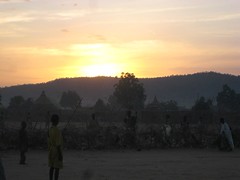 At about 4:30am, I start to hear the roosters compete for loudest. Then the donkeys follow with their heehawing, along with some confused horses jumping in to the fray. I toss and turn for about an hour, on my foam mattress on the floor, trying to get just a few more minutes of rest before starting another long day. I give up.
At about 4:30am, I start to hear the roosters compete for loudest. Then the donkeys follow with their heehawing, along with some confused horses jumping in to the fray. I toss and turn for about an hour, on my foam mattress on the floor, trying to get just a few more minutes of rest before starting another long day. I give up.
The night sky was amazing. The dark dome was completely filled with stars of all colors and brightness, and I had never seen a milkier Milky Way. Although I could really use electricity to work during the night, I was OK with trading those extra hours on our powered-up machines for that view of the vertigo inducing sky.
Today will be another full day at the camp. We have to prep for a live video conference that will happen tomorrow, connecting a Washington, DC VIP event with the camp and our VIP refugee friends, celebrating World Refugee Day. The camp has about 17,000 of these VIPs, so we can only invite a few.
 We are also preparing for a marathon of live-streaming on the actual World Refugee Day, June 20th. We will show camp life, walking the camp, as we regularly do for i-ACT, but this time with a camera that is feeding a live stream through the web. You can see this at refugeedaylive.org, with the show starting at 9am EST. You get to walk the camp with us!
We are also preparing for a marathon of live-streaming on the actual World Refugee Day, June 20th. We will show camp life, walking the camp, as we regularly do for i-ACT, but this time with a camera that is feeding a live stream through the web. You can see this at refugeedaylive.org, with the show starting at 9am EST. You get to walk the camp with us!
On our walk yesterday, I met an older woman named Jimya. She has one sick eye and two sad eyes. She lives alone. When she thinks of home, she sees her field full of trees and vegetables. Everything was destroyed by janjaweed, but she still sees it. She wants to go back, but not now. Peace first, she told me. She was collecting water. Jimya had the two smallest container from all the women at the water station. It’s all she can carry.
Laughter
 Since arriving in Goz Beida, the last two days have been a blur, more so than the five days of travel to get here. My overwhelming impression is that for a group of people that have been displaced from their homes and forced to live in a refugee camp, the residents of Camp Djabal still have a trust and openness I rarely find. Without fail, every single person smiles back when I acknowledge them. They let me in. I hold a grudge over things and lose trust in humanity for things so small, and here I’m meeting a group that has every reason not to see another human being without thinking there’s a large risk, yet they continue to show love like nothing has happened. I need to learn that trick.
Since arriving in Goz Beida, the last two days have been a blur, more so than the five days of travel to get here. My overwhelming impression is that for a group of people that have been displaced from their homes and forced to live in a refugee camp, the residents of Camp Djabal still have a trust and openness I rarely find. Without fail, every single person smiles back when I acknowledge them. They let me in. I hold a grudge over things and lose trust in humanity for things so small, and here I’m meeting a group that has every reason not to see another human being without thinking there’s a large risk, yet they continue to show love like nothing has happened. I need to learn that trick.
Of course, it’s not a trick. It’s a way of life.
 Over the blur of images from the last two days, I have images of endless smiles and the sound of continuing laughter. The kid’s are obsessed with the blonde hair on my arms, and they are constantly running their hands along to make sure it’s real. I had expected, as said in my previous entry, that white people entering the camps with video cameras was a common site, but every time I show anyone their own image on the video, it’s like magic. They are so overjoyed to see their faces, that one might suspect Darfurians are narcissists, but it’s obviously not that. I believe they are just pleased to be acknowledged, even if it’s by an inanimate object like a digital video camera. And of course, I like anyone who thinks I’m funny. They’re either laughing at me or with me, but I don’t care.
Over the blur of images from the last two days, I have images of endless smiles and the sound of continuing laughter. The kid’s are obsessed with the blonde hair on my arms, and they are constantly running their hands along to make sure it’s real. I had expected, as said in my previous entry, that white people entering the camps with video cameras was a common site, but every time I show anyone their own image on the video, it’s like magic. They are so overjoyed to see their faces, that one might suspect Darfurians are narcissists, but it’s obviously not that. I believe they are just pleased to be acknowledged, even if it’s by an inanimate object like a digital video camera. And of course, I like anyone who thinks I’m funny. They’re either laughing at me or with me, but I don’t care.
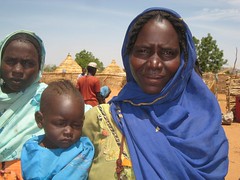 One clear preconceive notion that has been wiped immediately away is that this is not a group that needs pity. They are not helpless. Not even close. Neither I, nor those westerners that have walked here before me are any types of saviors to be put on a pedestal. We all merge into the cacophony of support that any human would need being in a refugee camp, but are mostly witnesses to an undeniable force of endurance and adaptability. The 17,000 people in this camp are not waiting around for the western world to save them…there is no moss growing on these rolling stones. They are hard at work, educating themselves, creating homes out of the environment, and keeping the family unit in tact, all while advocating to anyone that will listen that they want one simple thing….to go home.
One clear preconceive notion that has been wiped immediately away is that this is not a group that needs pity. They are not helpless. Not even close. Neither I, nor those westerners that have walked here before me are any types of saviors to be put on a pedestal. We all merge into the cacophony of support that any human would need being in a refugee camp, but are mostly witnesses to an undeniable force of endurance and adaptability. The 17,000 people in this camp are not waiting around for the western world to save them…there is no moss growing on these rolling stones. They are hard at work, educating themselves, creating homes out of the environment, and keeping the family unit in tact, all while advocating to anyone that will listen that they want one simple thing….to go home.
Ian
Sustainable Beauty
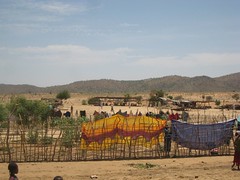 This environment is unforgiving. I have been in Chad during various seasons, and in June twice. This trip is one of the hottest I have experienced. An almost humid, but also dry heat that you just cannot escape or cool down from. When there is a breeze, you almost always miss it for one reason or another. This is an environment in which only a few cultures can survive sustainably.
This environment is unforgiving. I have been in Chad during various seasons, and in June twice. This trip is one of the hottest I have experienced. An almost humid, but also dry heat that you just cannot escape or cool down from. When there is a breeze, you almost always miss it for one reason or another. This is an environment in which only a few cultures can survive sustainably.
My culture would try. But without the vast experience of generations passed down from those who have cultivated from this land, I feel we would not be able to do it.
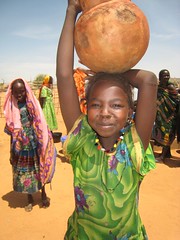 Women do much of the daily work, and many times most of any type of work in the camps. Today men worked together on two prototype homes that would better protect them from fires that have swept through the closely-knit sectors, destroying many straw tukuls at a time. In my experience here, this image of men working is a rare one. It is usually the women who dig the dirt, add water, mix, and form bricks. Carrying one or two upon their heads, laying the foundation, and solidifying the structure with “poto poto” or clay.
Women do much of the daily work, and many times most of any type of work in the camps. Today men worked together on two prototype homes that would better protect them from fires that have swept through the closely-knit sectors, destroying many straw tukuls at a time. In my experience here, this image of men working is a rare one. It is usually the women who dig the dirt, add water, mix, and form bricks. Carrying one or two upon their heads, laying the foundation, and solidifying the structure with “poto poto” or clay.
The women and girls are the ones who fetch, and carry on their heads water for the day. Each and every day they do this. Many must leave the camp to collect firewood and we continue to hear stories of the threat of violence against them for doing so. This journey takes anywhere from several hours to the entire day. Some are lucky enough to have donkeys to help carry wood. Several women I have seen this trip carry the wood upon their heads. How many miles did they walk?
 In Darfurian culture, like in most, the women make the meals. We saw vendors at the camp market, many were trading their rations for other things, like meat, dried okra, or sun-dried tomatoes. Items we think of as everyday necessities – vegetables and protein like meat – are a rarity for the average Darfur refugee. They hand grind the sorghum rations with a standing mortal and pestal.
In Darfurian culture, like in most, the women make the meals. We saw vendors at the camp market, many were trading their rations for other things, like meat, dried okra, or sun-dried tomatoes. Items we think of as everyday necessities – vegetables and protein like meat – are a rarity for the average Darfur refugee. They hand grind the sorghum rations with a standing mortal and pestal.
The government of Chad has allowed them a few kilometers to cultivate this season, and many are beginning to plant before the rains come. At least they can do this here, rather than risking their life to return to Darfur for the extra food. The walk to the garden is far and long, but worth the energy.
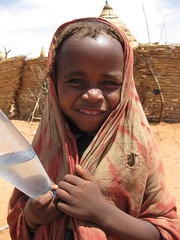 I am constantly and consistently amazed at the work ethic in this culture. I am not sure I would be able to do all the same things in one day and still smile and exude the beauty of the Darfur people of Djabal. I am not sure very many people would be able to survive in this land. Let alone in a way that is so different from their traditional life.
I am constantly and consistently amazed at the work ethic in this culture. I am not sure I would be able to do all the same things in one day and still smile and exude the beauty of the Darfur people of Djabal. I am not sure very many people would be able to survive in this land. Let alone in a way that is so different from their traditional life.
The strength, the stamina, the courage, the beauty of the Darfur people needs to be preserved and fostered. It must survive.
Our world gets smaller as cultures are lost. Our world must remain big and full, as we all still have so much to learn.
Paz, ktj
Pictures:
http://www.flickr.com/photos/stopgenocidenow/3632802551/
~~~~~~~~~~~~~~~~~~~~~~~~~~~~~~
Journal Entries, posted so far for Day 4
Day 4 Action: Text Clinton
Today, Thursday June 18, 2009, Secretary of State Clinton will be attending a special event for World Refugee Day in Washington D.C. with Angelina Jolie, Anderson Cooper, and the United Nations High Commissioner for Refugees Anontio Guterres. i-ACT will be bringing our friend Rahma from Chad, through video, to meet Secretary of State Clinton. You too can be part of i-ACT by TEXTing Cinton at 90822. Send her this message:
Today you met refugees from Camp Djabal. What are you doing to help them return home to Darfur?
Don’t forget to plan on checking in with our live video feed for Saturday June 20th, World Refugee Day, from Camp Djabal.
~~~~~~~~~~~~~~~~~~~~
When I was younger, and voicing my concerns about a situation, I would whine, “It’s not fair.” And my mother would simply state the truth, “life is not fair.” My complaints were trivial, but her answer could not have been more true.
All the paths of a refugee camp end up looking the same. Especially in Camp Djabal where high straw fences line the camp and section off compounds. We cannot find Rahma’s house on our own instinct, and we soon give up and ask a group of boys huddled under a tree.
They repeat Rahma’s full name, and begin walking. We follow. Gabriel finds a photo of Rahma on his camera and we are assured we are heading in the right direction. We pass through many alley ways and by tents, and straw tukuls, drying clothes flapping in the wind, and women conversing with one another in the shade.
“Rahma!”
“Gabriel”
“Rahma”
“Khadija”
I embrace him with friendship. Gabriel is smiling. Rahma is smiling. Eric and Ian are smiling. New friends and old reunited! The feeling seems mutual. Rahma talks with us for a moment and asks how are our families and the people in America. His English has approved so much.
Rahma is elated that we are here and we can see it dance in his eyes. But as Gabriel begins to ask about his life and family, sadness creeps in. A mixture of emotions. His eyes look down, and he points to the other side of the camp.
“My mother. She is sick. In the hospital.”
We begin to make our way towards the camp clinic. Rahma’s sister, Hawa, is near the entrance, and grandmother sits bedside. Hawa’s eyes are sad and her gaze serious. Their mother has been here for three days. Her aching body lies very still in bed.
“I am angry today,” Rahma shares with us. He doesn’t know what ails his mother.
We seek a doctor and meet with a very gracious and open man. The exchange is translated from French to Arabic to English. I can see the temperature chart. It was high, then down a bit, peaked, and has been going down, but still not stable. He reads off two types of medicine, one of which is the general antibiotic amoxicillin used for infections. Rahma’s mother’s suffers from a pelvic infection. The other medication is for malaria.
I am angry and very, very sad. Will the medicine work? How can her body, which most likely has a low immune system from dietary options, fight both at one time? I know these doctors, with so many patients and such few resources, are true heroes. But my heart reaches out to Rahma and his family. I wish she were some place else with more medical options.
It will be a short time before they know if the medications are working. If life appears to be coming back, she will go home in three days and continue the medication there. If she simply does not regain strength, then she will be transferred to the hospital in Goz Beida.
After many more hours in the camp and testing live video feed for both tomorrow’s event with Angelina Jolie and Secretary of State Clinton and Saturdays 4 1/2 hour live show, we return to our small compound for an hour to shower before heading to the UNHCR office to work, and sleep as we can. As the others shower, I sit, drink water and begin to cry as I think about Rahma and his mother.
I think of my own mother and the medical care she and I have access to. She is my only mother, and for so long, it was only her and I. I cannot imagine what it would feel like to be Rahma, or his sister, or grandmother. I cannot imagine my mother falling ill with such things that are easily cured and prevented, but could be life threatening here. All I can do is sit in the dark, watch the approaching lightning storm, wait for the rain, and cry.
Life is just not fair.
~~~~~~~~~~~~~~~~~~~~
Sudan Envoy: Darfur experiencing 'remnants of genocide' -- Says aid capacity back near 100%
I don't believe that aid capacity is back near 100%
June 17, 2009 12:22 PM
http://blogs.abcnews.com/politicalpunch/2009/06/-sudan-envoy-darfur-experiencing-remnants-of-genocide-says-aid-capacity-back-near-100ABC News' Kirit Radia reports:
President Obama's Special Envoy for Sudan Scott Gration, a retired Air Force general who grew up in Africa, today refused to describe the situation in Darfur as ongoing genocide.
"What we see is the remnants of genocide," he said, implying the wartorn region's worst violence is behind it.
"It doesn't appear that it is a coordinated effort that was similar to what we had in 2003 to 2006," Gration of the violence.
His hesitation stems from disagreements within the Obama administration, and pressure from interest groups like the Save Darfur Coalition.
Sources say Gration has reported back from his trip to Darfur earlier this year that the level of violence in Darfur does not currently warrant being called genocide, but officials like UN Ambassador Susan Rice, who served as top Africa official at the State Department during the Rwandan genocide, insist the situation should still be labeled as such.
In fact, just two days ago during a speech in Vienna, Austria Ambassador Rice described the situation in Darfur as "genocide."
At a press conference in Germany on June 5, a day after his major speech to the Muslim world speech, President Obama referenced his comments on Darfur in the speech as "genocide that's taking place."
The Bush administration frequently used genocide to describe the violence in the region after then-Secretary of State Colin Powell branded it as such in 2004.
Gration's approach appears to be more holistic than that of his predecessors, whose attention was mainly on the conflict in Sudan's Darfur region. Instead, Gration says he is working to address all of Sudan's problems, but it appeared his emphasis was on the deteriorating conditions in Southern Sudan, where a tenuous peace deal that ended Sudan's bloody civil war is up for referendum in 19 months.
Gration said violence in the south has seen an "uptick" and is now in fact greater than the violence in Darfur.
Gration said that aid capacity in Darfur is back up near 100% and may soon exceed capacity before 13 aid groups were expelled earlier this year. Sudan has allowed remaining aid groups in Darfur to beef up capacity and has allowed three new groups to come in and pick up the slack.
"We've been able to work with the government of Sudan and NGOs and United Nations to restore humanitarian assistance capacity in Darfur," he said. "We've essentially closed the humanitarian gap that existed in Darfur when the 13 NGOs were expelled."
He said much of the capacity now is emergency work, Gration warned, but he said he hopes soon that will be transferred to sustained aid projects.
--Kirit Radia
~~~~~~~~~~~~~~~~~~~~~~~~~~~
Remarks by Ambassador Susan E. Rice
US Permanent Representative
on the UN Security Council and the Responsibility to Protect
at the International Peace Institute Vienna Seminar, June 15, 2009
Read Susan Rice's speech:www.isria.com/pages/15_June_2009_47.htm
~~~~~~~~~~~~~~~~~~~~~~~~~~~
Text of Scott Gration
The video of Scott Gration answering questions
http://www.state.gov/video/?videoid=26615130001
Write to President Obama
http://www.whitehouse.gov/contact/
You can also write to the President at:
The White House
1600 Pennsylvania Avenue NW
Washington, DC 20500
President Obama can be called:
202-456-1111
or
1-800-GENOCIDE
The White House comment line is available
9:00 a.m. - 5:00 p.m. weekdays
~~~~~~~~~~~~~~~~~~~~~~~~~~~~~~~
Find USA elected politicians contact information at this link:
www.usa.gov/Contact/Elected.shtml
~~~~~~~~~~~~~~~~~~~~~~~~~~~~~~~
Labels: Arrest, Bashir, Darfur, DJABAL, GENOCIDE BY STARVATION, HUMANITARIAN, ICC, ilovemylife, Matthew 25, Newport, PRESIDENT OBAMA TELL NO LIES, Rhode Island, Rights, Sandra Hammel, STAIN, Sudan, Water


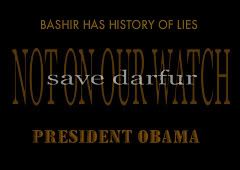

0 Comments:
Post a Comment
Subscribe to Post Comments [Atom]
<< Home